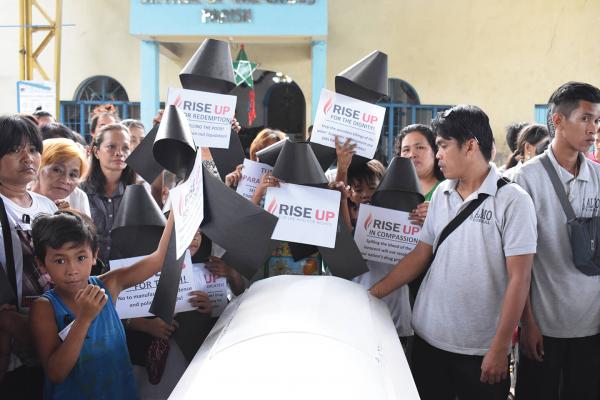Two weeks after President Donald Trump invited the president of the Philippines, Rodrigo Duterte, to the White House, both presidents have escalated militarism under rhetoric of combatting the Islamic State when other motivations seem apparent.
Amid the release of a transcript in which Trump bragged to Duterte of nuclear submarines outside North Korea and in which Trump praised Duterte for doing an “unbelievable job on the drug problem,” Duterte has said he will be "harsh" in imposing martial law in Mindanao, Southern Philippines, calling to mind ghastly human rights violations under the martial law policy of the infamous regime of Ferdinand Marcos.
The heightening militarism following Trump’s invitation to Duterte is neither unrelated nor isolated from U.S imperialism in the Philippines — a history that is often manipulated through religious language.
In 1903, President William McKinley said this:
When I next realized that the Philippines had dropped into our laps I confess I did not know what to do with them … I went down on my knees and prayed Almighty God for light and guidance more than one night … that there was nothing left for us to do but to take them all, and to educate the Filipinos, and uplift and civilize and Christianize them.
Just as McKinley backed his actions for U.S. expansion with divine will, so Trump has built his campaign around his own kind of religious extremism, banging the words “God Bless America” as his drumbeat to global dominance as he continues aggressive warfare in oil-rich areas, often at the cost of civilian life.
In early May, 2,600 U.S. troops in the Philippines joined 2,800 from the Armed Forces of the Philippines for the annual Balikatan exercises — a 30 year program designed to directly train Philippine troops, who have gone on to continuously commit gross human rights violations against poor and Indigenous communities. According to Karapatan, a leading human rights organization in the Philippines, from 2010 to 2016 alone, 333 extrajudicial killings occurred at the hands of Philippine military.
U.S. complicity in the killings is also monetary: The U.S. has granted the Armed Forces of the Philippines tens of millions of dollars annually to fund the Philippine government's 48-year war against the Communist Party of the Philippines-National Democratic Front-New People's Army. The strategic geopolitical location of the Philippines has remained so important for American empire that the U.S. has provided military aid and political support since martial law under the Marcos dictatorship.
Duterte declaring martial law in Mindanao, and threatening to expand it to the whole nation would only increase the already abhorrent human rights killings at the hands of the U.S. trained Philippine military. Hundreds have already been displaced under what Duterte called an all-out war.
So have basic rights of the people: In one case, Bishop Carlo Morales was detained while meeting with a consultant to the peace talks, despite protections between the National Democratic Front (NDF) and the Philippine Government (GRP) under the Joint Agreement on Safety and Immunity Guarantees that protect such consultants. The bishop was only a bystander, arrested for advocating for peace and basic human rights agreements.
At the heart of the peace talks between the GRP and NDF is the Comprehensive Agreement on Social and Economic Reforms, a document that proposes social and economic reforms, including an independent foreign policy for the Philippines, which would address the root problems of armed conflict.
As Suara Bangsamoro, a Moro organization operating in the same region as the recent crisis in Marawi, stated:
The establishment of a new caliphate and a global Islamic State has become an inspiring goal to [Maute, the alleged ISIS group] because of the government’s insincerity and tokenism in resolving the core problems of the Moro people – inequity in the distribution of wealth and resources, government neglect to basic social services, lack of job opportunities, right to self-determination, among others.
If peace talks are to truly promote peace, these root causes of war must be addressed.
So when the people of the Philippines call Duterte to address these causes and to end martial law — it is also a demand that goes directly to people in the United States and to President Trump, the direct funder of such human rights abuses.
McKinley and Trump have their prayers — and Duterte now waits with an invitation to the White House. But God does not wait on the White House, and the Filipino people do not wait on the White House.
As Eric Stoner reports in the Sojourners June 2017 issue,
A new ecumenical network of people of faith — including clergy from the Catholic Church, United Church of Christ, and the United Methodist Church — and groups such as Kalipunan ng Damayang Mahihirap (KADAMAY), the largest alliance of urban-poor organizations in the country, launched Rise Up for Life and for Rights in October.
Christians in the Philippines have been on the frontlines challenging and bringing down injustice for decades. Priests, pastors, nuns, and laypersons rallied in the streets against Marcos in 1991. They marched against the return of U.S. military control in the country with the Visiting Forces Agreement and the Balikatan exercises. They have been staunch defenders of people’s rights — from the dispossessed Lumads, the robbed tillers of land, the peasants burdened by drought and fired upon by the reactionary state, the poor who suffered during typhoons, and the bishop who remains imprisoned for following living in the way of peace.
As people of faith in the U.S., we can no longer watch our funds go to war or hope for an impeachment — we ourselves must participate in and bring forth just and lasting peace as we rise against the powers and principalities of this world.
Got something to say about what you're reading? We value your feedback!






